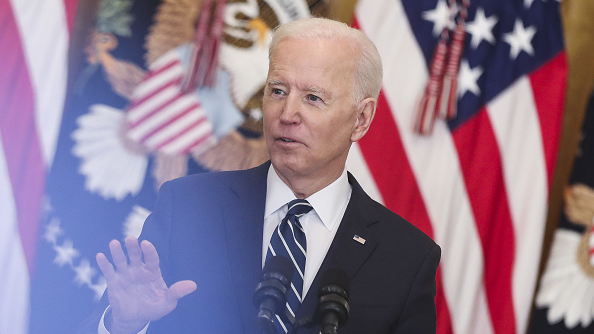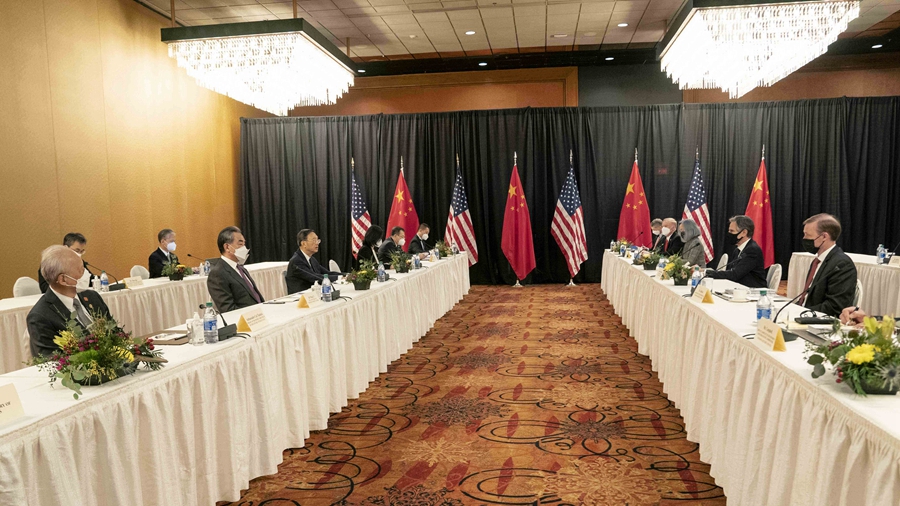
U.S. President Joe Biden speaks during a news conference in the East Room of the White House in Washington, D.C., U.S., March 25, 2021. /Getty
U.S. President Joe Biden speaks during a news conference in the East Room of the White House in Washington, D.C., U.S., March 25, 2021. /Getty
Editor's note: Azhar Azam works in a private organization as market and business analyst and writes about geopolitical issues and regional conflicts. The article reflects the author's opinions and not necessarily the views of CGTN.
The economically nostalgic Donald Trump talked about China so much that he looked weird when a compilation was cobbled together with the number of times the former U.S. president babbled about China. In the end, both his narrowed approach toward Beijing and hardly a half-phrased foreign policy – China, China, China – floundered badly and his presidency is now history.
During the presidential campaign, he roasted Joe Biden for being soft on China and launched a smear campaign, "Beijing Biden," to damage his rival politically. Although Trump lost his second bid for the White House, he left lawmakers who would keep reminding Biden that America's foreign policy issue for the entire 21st century will be "China, China and China" and it is likely to be on Biden's top foreign policy priorities.
Washington's Beijing dilemma is all about the fall of military adventurism and interventionism and the rise of cooperation and economic integration. As global leaders doubt that America could lead the world even through an old gory fashion and question if it somehow manages to do that, how long would it survive – the U.S. perspective on China as a rival state for global influence perhaps will never change.
Biden is making efforts to end the U.S. isolation at the global stage by quashing Trump's "America First" policy. But Washington's European allies, aware of Trumpism in U.S. politics, are concerned they could come across another president in 2024 who would again take the country back to isolationism, insult and humiliate them and pull out of the Paris Agreement.
China, by comparison, is now considered a real political and economic power that in addition to winning "hearts and minds" of global citizens, it is maturing itself from being a rules-follower country to the rules-setter nation. Therefore, Biden sees the U.S. standing at a "great inflection point" and falling behind in competition with China to win the 21st century.
In his remarks on America's place in the world, Biden said there wasn't any country that could match America. With 50 women killed by inmates every month, systemic racism plaguing the country and 250 Americans shot dead in the streets within a week between mass shooting events in Georgia and Colorado – the U.S. is obviously a peerless state, which isn't losing international relevance not because of rivals instead over growing intolerance and violence.
The U.S. has finally comprehended no matter how powerful, it cannot address the challenges alone and multilateral cooperation is the absolute necessity. Unfortunately, the good sense is confined to soft-soaping only as the Biden administration most recently has taken coordinated actions on Xinjiang, issued a stroppy joint statement with Japan vis-à-vis peace and stability in the Taiwan Straits and tried to gang up Group of Seven (G7) nations against Beijing.

High-level strategic dialogue between China and the U.S. starts in Anchorage, Alaska, U.S., March 18, 2021. /Xinhua
High-level strategic dialogue between China and the U.S. starts in Anchorage, Alaska, U.S., March 18, 2021. /Xinhua
However, officials in the administration have little faith that strategy to rally allies to confront China would work as Beijing in the past few years had substantially evolved into a robust and resilient international force and a major economy with advanced technological capability, which can withstand extreme pressure and come out more strongly whenever it is put to test.
It was hence albeit criticism on China over alleged human rights abuses and "coercive economic policies" – some of the key G7 member states refrained from taking any practical measures against the world's biggest market while tone of the joint communique – hailing China's centrality to fight the global challenges – was very circumspect.
The opposing views further described not all countries within the grouping agreed that the confrontational diplomacy was worth consideration, let alone be pursued to stir up tensions with the world's second largest economy. This trend would go on to force Biden, who's keeping Trump's unilateral policies intact in his dealing with Beijing, to make some changes in his foreign policy on China.
Some say China is a "paper dragon," arguing its economic, technological and military advancements are vastly exaggerated and asking Americans to hear the "perspective of confidence." But the lopsided analysis still dismissed trade protectionism and trade war.
After all, neither will a potential clash benefit two nations and the world grappled with the pandemic nor does it contribute to the global peace and security. Any frictions between two powers will cripple global fight against the pandemic and help terrorists across regions to regroup and exploit the catastrophe to promote and impose their extremist views.
China was a political buzzword that handed over Trump the U.S. presidency in 2016. Four years later, the hocus-pocus can't beguile Americans and Biden took over on issues relating to health and economy. Biden's parroting of "China, China, China" through advisers or allies won't fulfill promises he made to nation. For that, he is required to engage China and make full use of the biggest market in the world.
(If you want to contribute and have specific expertise, please contact us at opinions@cgtn.com.)

